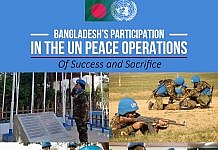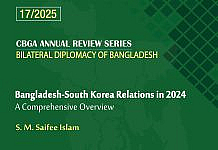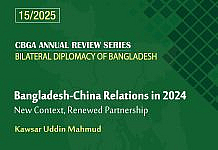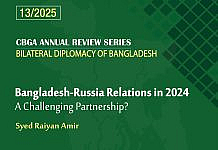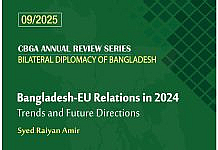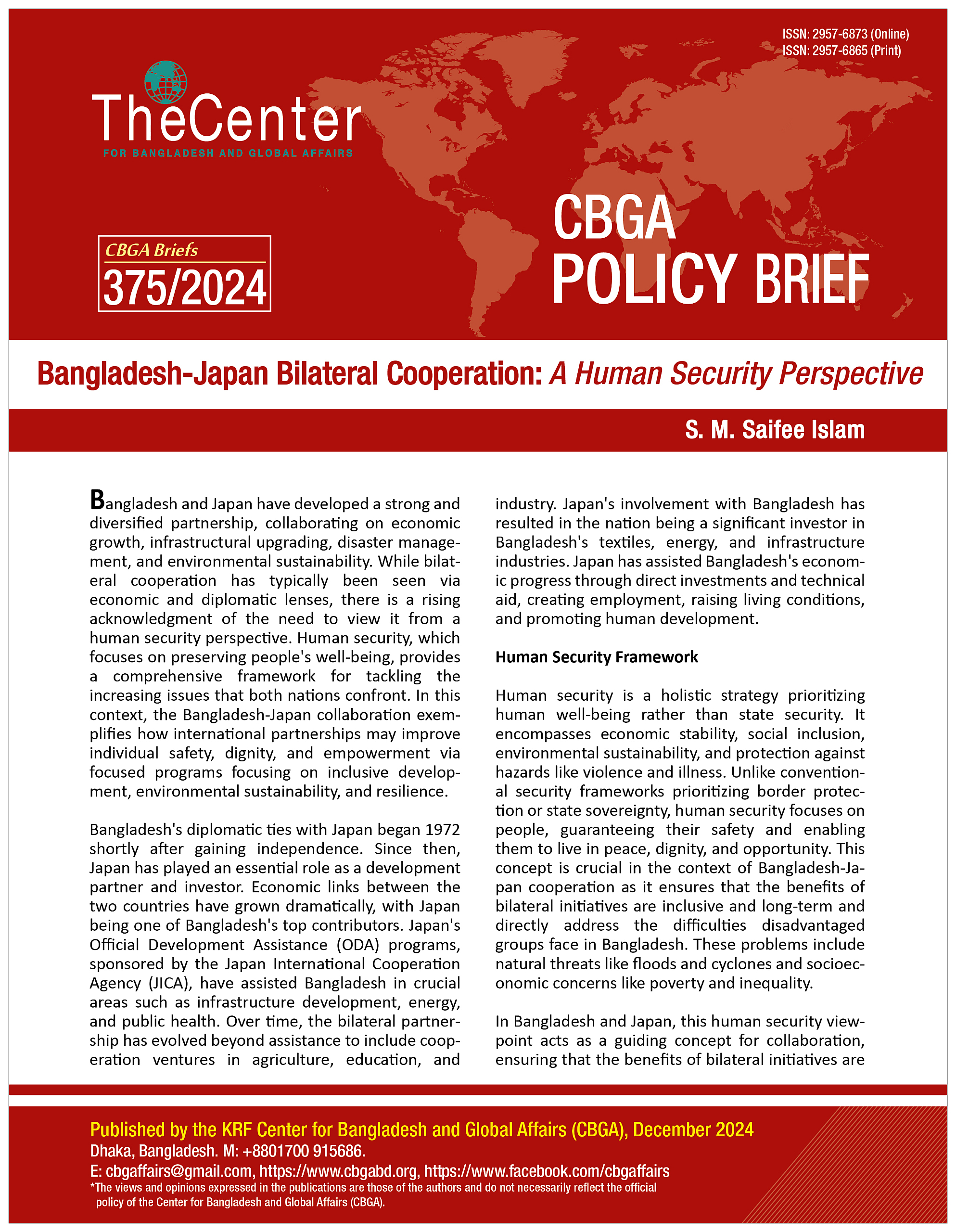
Bangladesh and Japan have developed a strong and diversified partnership, collaborating on economic growth, infrastructural upgrading, disaster management, and environmental sustainability. While bilateral cooperation has typically been seen via economic and diplomatic lenses, there is a rising acknowledgment of the need to view it from a human security perspective. Human security, which focuses on preserving people’s well-being, provides a comprehensive framework for tackling the increasing issues that both nations confront. In this context, the Bangladesh-Japan collaboration exemplifies how international partnerships may improve individual safety, dignity, and empowerment via focused programs focusing on inclusive development, environmental sustainability, and resilience.
Bangladesh’s diplomatic ties with Japan began 1972 shortly after gaining independence. Since then, Japan has played an essential role as a development partner and investor. Economic links between the two countries have grown dramatically, with Japan being one of Bangladesh’s top contributors. Japan’s Official Development Assistance (ODA) programs, sponsored by the Japan International Cooperation Agency (JICA), have assisted Bangladesh in crucial areas such as infrastructure development, energy, and public health. Over time, the bilateral partnership has evolved beyond assistance to include cooperation ventures in agriculture, education, and industry. Japan’s involvement with Bangladesh has resulted in the nation being a significant investor in Bangladesh’s textiles, energy, and infrastructure industries. Japan has assisted Bangladesh’s economic progress through direct investments and technical aid, creating employment, raising living conditions, and promoting human development.
Human Security Framework
Human security is a holistic strategy prioritizing human well-being rather than state security. It encompasses economic stability, social inclusion, environmental sustainability, and protection against hazards like violence and illness. Unlike conventional security frameworks prioritizing border protection or state sovereignty, human security focuses on people, guaranteeing their safety and enabling them to live in peace, dignity, and opportunity. This concept is crucial in the context of Bangladesh-Japan cooperation as it ensures that the benefits of bilateral initiatives are inclusive and long-term and directly address the difficulties disadvantaged groups face in Bangladesh. These problems include natural threats like floods and cyclones and socioeconomic concerns like poverty and inequality.
In Bangladesh and Japan, this human security viewpoint acts as a guiding concept for collaboration, ensuring that the benefits of bilateral initiatives are inclusive and long-term and directly address the difficulties disadvantaged groups face in Bangladesh. These problems include natural threats like floods and cyclones and socioeconomic concerns like poverty and inequality. Japan, via the Japan International Cooperation Agency (JICA), has implemented a diversified strategy to improve human security in Bangladesh. Its policies prioritize tackling vulnerabilities in health, education, and disaster management, which align with Bangladesh’s development objectives and the Sustainable Development Goals (SDGs). Japan seeks to construct resilient systems and promote sustainable prosperity in Bangladesh by utilizing its experience, technical skills, and long-standing collaborations.
Health Sector Interventions
JICA has prioritized healthcare system improvement to accomplish SDG 3 and reduce public health hazards. It tackles structural issues such as inadequate healthcare infrastructure, a shortage of medical workers, and a lack of efficient disease-preventive procedures. Recognizing that 74% of healthcare expenditures are paid for out of pocket, JICA promotes the construction of comprehensive health insurance systems and improves the quality of public healthcare to decrease people’s financial burden.
Japan’s efforts also include addressing noncommunicable diseases (NCDs), which are responsible for 67% of fatalities in Bangladesh owing to changing lifestyles and dietary patterns. By merging Japanese technical knowledge, JICA improves diagnostic skills, raises awareness, and increases preventive healthcare. Long-term programs concentrate on mother and child health, which has improved significantly over time. However, the shortage of medical staff remains problematic, with just 8.3 healthcare workers per 10,000 people, far below than the SDG requirement. JICA tackles this issue via capacity development, training, and technical collaboration, notably in nursing and healthcare management.
Educational Reforms
JICA’s education initiatives are aligned with SDG Goal 4, which aims to strengthen primary and technical education. While elementary education has outstanding enrolment rates of 97.8%, learning quality remains poor, notably in mathematics and science, with just 31% of children reaching targeted academic results. Japan provides policy and technical assistance to strengthen teaching methods and curricula that promote critical thinking and problem-solving abilities.
JICA promotes technical education methods influenced by Japan’s industrial colleges, which was critical in the country’s fast economic development. These programs attempt to create industrial human resources essential for economic growth. To address secondary and higher education difficulties, including low enrolment rates and restricted access for economically disadvantaged populations, JICA supports building ICT infrastructure for distance learning and focusing more on STEM subjects. Efforts are also made to reduce dropout rates and address socioeconomic hurdles such as child marriage.
Disaster Management and Climate Change Mitigation
Bangladesh’s susceptibility to natural catastrophes and climate change has made disaster preparation a crucial priority for JICA. Bangladesh is the sixth most susceptible to climate change, with regular floods, cyclones, and storm surges. JICA contributes to developing catastrophe forecasting systems, national preparation plans, and local risk assessments. The Bangladesh Delta Plan 2100 is a crucial program funded by Japan to improve proactive disaster prevention techniques. Japan’s aid in constructing cyclone shelters, enhancing flood warning systems, and improving disaster recovery infrastructure have significantly reduced fatalities and recovery periods. These joint efforts between Japan and Bangladesh have bolstered local communities’ resilience to natural disasters, ensuring the safety of vulnerable populations. This success serves as a testament to the potential of future collaborative initiatives.
Japan also helps reduce earthquake risk in Dhaka. Growing urbanization has overtaken regulatory frameworks, leaving the city vulnerable to large-scale damage in the event of a significant seismic catastrophe. JICA focuses on increasing building safety, supporting land-use planning, and boosting construction inspections.
Economic Development
Economic growth is a cornerstone of human security, impacting people’s quality of life and ability to thrive. Japan’s significant role in promoting sustainable infrastructure development in Bangladesh, particularly in critical areas such as electricity, transportation, and urban development, has been instrumental. These infrastructure projects stimulate economic growth and employ thousands, contributing to population and financial stability. Japan’s development aid to Bangladesh focuses on poverty reduction, education, and healthcare. Programs aiming to increase access to primary education, improve healthcare services, and offer vocational training for marginalized populations are critical to building a more inclusive society. These activities are consistent with the human security framework since they address economic inequities and enable people to improve their living conditions.
Environmental Sustainability
Environmental sustainability stands as a cornerstone of human security, especially in countries like Bangladesh, where the profound impacts of climate change remain an ever-present reality. In this context, Japan has emerged as a proactive ally, playing an instrumental role in developing green technology and implementing strategies to mitigate the harmful consequences of climate change in this vulnerable nation. Through innovative initiatives like the Mujib Climate Prosperity Plan, Japan has been pivotal in guiding Bangladesh toward a more sustainable economic model.
Joint efforts between Bangladesh and Japan emphasize exploring and implementing renewable energy sources, such as solar and wind power, alongside comprehensive waste management solutions. Japan’s extensive technical knowledge and expertise in these fields have empowered Bangladesh to significantly reduce its carbon footprint, delivering cleaner, more sustainable energy options to its citizens while addressing the urgent issue of environmental degradation. Additionally, Japan’s vital assistance in managing water resources, enhancing air quality, and combating deforestation works to fortify the resilience of Bangladesh’s most at-risk populations, ensuring they are better equipped to face the challenges of a changing climate.
JICA works with Bangladesh to execute the mitigation and adaptation strategies indicated in the country’s Nationally Determined Contributions (NDC). These strategies involve lowering greenhouse gas emissions, boosting renewable energy, and developing climate-resistant infrastructure.
Social Inclusion
Human security is not solely defined by physical safety; it also encompasses the vital concept of social inclusion, which involves integrating marginalized groups into the fabric of society and ensuring equitable access to essential resources and services. In this regard, the collaboration between Japan and Bangladesh has been a beacon of hope, focusing on empowering women, youth, and vulnerable populations through targeted skills development, innovative business programs, and accessible educational opportunities.
Promoting gender equality has emerged as a fundamental aspect of the partnership between Bangladesh and Japan. Both nations are committed to formulating policies and programs championing women’s empowerment and fostering leadership across diverse fields. Through dynamic vocational training initiatives and enterprising business programs, Japan has provided women with the tools for economic independence, enabling them to contribute actively and meaningfully to their communities. Furthermore, Japan’s concerted efforts to combat child labor, provide educational opportunities for marginalized groups, and enhance youth empowerment are instrumental in creating a more inclusive society and cultivating hope and resilience for long-term human security.
Challenges
Despite Bangladesh and Japan’s bilateral solid connections, the human security framework confronts several problems that prevent its effective implementation. Political instability in Bangladesh is one of the most significant difficulties. Without a stable political context, securing long-term commitments to initiatives is difficult, particularly those aimed at catastrophe risk reduction, social inclusion, and sustainable economic growth. Furthermore, resource allocation remains a primary concern. While Japan has offered significant help, ensuring that aid reaches the most vulnerable communities efficiently is challenging due to governance issues in Bangladesh.
Conclusion
When viewing the Bangladesh-Japan collaboration through the lens of human security, it becomes clear how critical it is to address the particular needs and vulnerabilities of both nations’ people. Bangladesh and Japan’s engagement, which focuses on disaster management, economic growth, environmental sustainability, and social inclusion, shows how international collaborations may help construct resilient communities. As both nations continue to collaborate, there are many prospects for development and cooperation. Bangladesh and Japan can assure a more peaceful, prosperous, and sustainable future for their inhabitants by continuing to invest in human security, encouraging long-term peace and prosperity in both countries.
– S. M. Saifee Islam is a Research Associate at the KRF Center for Bangladesh and Global Affairs (CBGA).


